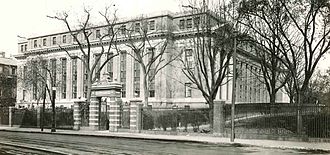| Harvard Library | |
|---|---|
 | |
 Widener Library, the largest and primary library of Harvard University | |
 | |
| 42°22′24″N71°07′07″W / 42.3733923°N 71.1186862°W | |
| Location | Cambridge, Massachusetts, U.S. |
| Type | Academic library system of Harvard University |
| Established | 1638 [1] |
| Branches | 28 |
| Collection | |
| Items collected | 16,832,952 volumes held, 180,000 serial titles, an estimated 400 million manuscript items, 10 million photographs, 124 million archived web pages, and 5.4 terabytes of born-digital archives and manuscripts. [2] |
| Size | 16,832,952 volumes held (2022) |
| Access and use | |
| Circulation | 733,890 [3] (2013) |
| Other information | |
| Budget | US$250 million(2020) |
| Director | Martha Whitehead |
| Employees | around 800 total (2020) [2] |
| Website | library |
Harvard Library is the network of libraries and services at Harvard University, a private Ivy League university in Cambridge, Massachusetts. Harvard Library is the oldest library system in the United States and both the largest academic library and largest private library in the world. [4] [5] Its collection holds over 20 million volumes, 400 million manuscripts, 10 million photographs, and one million maps. [6]
Contents
- History
- Holdings
- Publications
- Organizational structure
- Governance
- Library Visiting Committee
- Library Board
- Faculty Advisory Committee
- Library Council on Student Experience
- Library Leadership Team
- Harvard libraries
- Librarians
- See also
- References
- Further reading
- External links
Harvard Library holds the third-largest collection of all libraries in the United States, after the Library of Congress and Boston Public Library, by number of volumes held. [7] Among libraries, measured on the number of all items held, it is the fifth-largest library in the nation. [8] Harvard Library is a member of the Research Collections and Preservation Consortium (ReCAP); other members include Columbia University Libraries, Princeton University Library, New York Public Library, and Ivy Plus Libraries Confederation, making over 90 million books available to the library's users. [9]
The library is open to current Harvard affiliates, and some events and spaces are open to the public. The largest and most recognized building in the Harvard Library system is Widener Library in Harvard Yard.